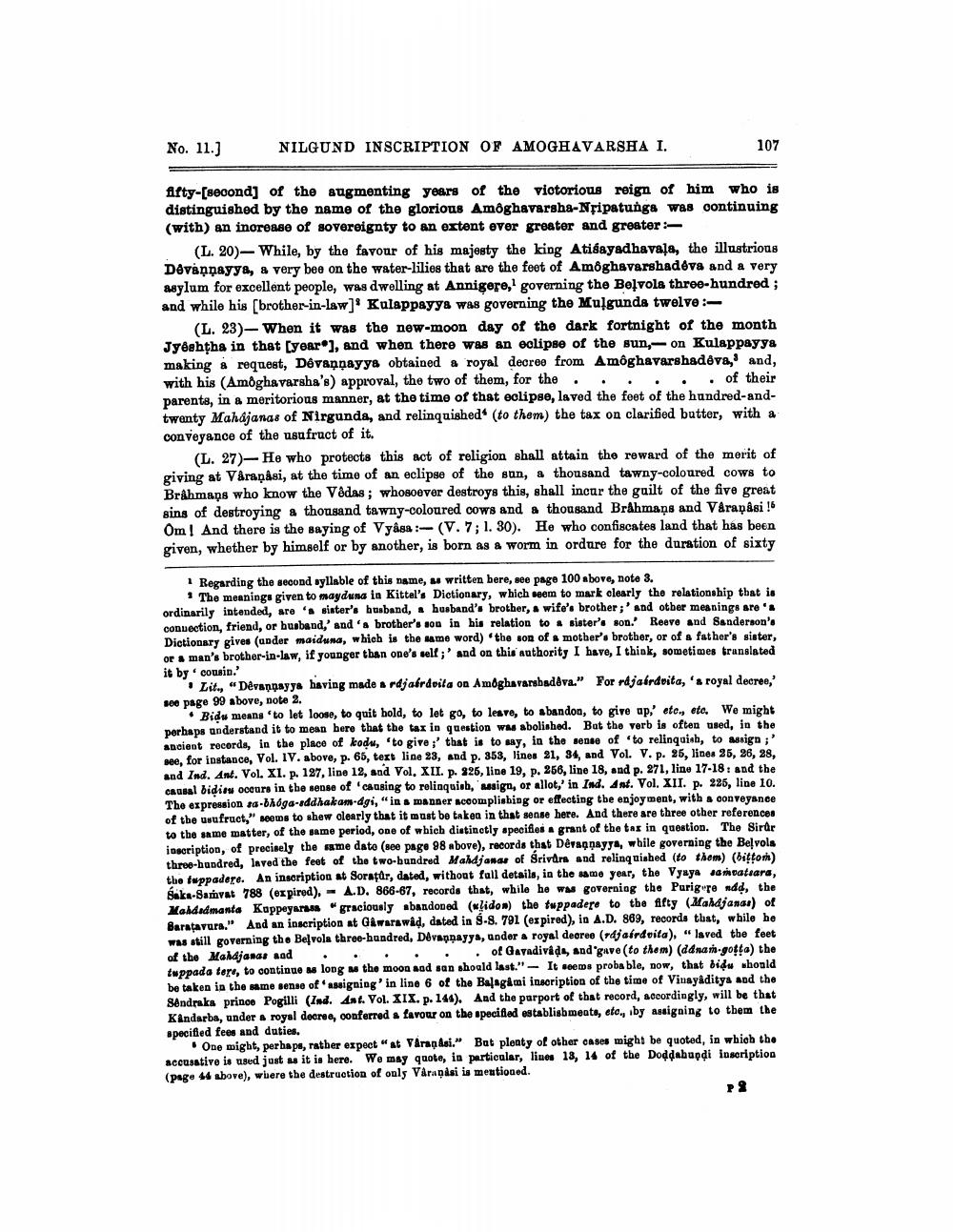________________
No. 11.)
NILGUND INSCRIPTION OF AMOGHAVARSHA I.
107
fifty-[second] of the augmenting years of the viotorious reign of him who is distinguished by the name of the glorious Amoghavarsha-Nripatungs was continuing (with) an inorease of soveroignty to an extent over greater and greater
(L. 20)-While, by the favour of his majesty the king Atisayadhavala, the illustrious Devaņņayya, a very bee on the water-lilies that are the foot of Amoghavarshadova and a very asylum for excellent people, was dwelling at Annigere,' governing the Beļvola three-hundred ; and while his brother-in-law]' Kulappayys was governing the Mulgunds twelve :
(L. 23)- When it was the new-moon day of the dark fortnight of the month Jyoshtha in that [year], and when there was an eclipse of the sun-on Kulappayya making a request, Dévannayye obtained a royal decree from Amoghavarshadeva, and, with his (Amoghavarsha's) approval, the two of them, for the . . . . . . of their parents, in a meritorious manner, at the time of that eclipse, laved the feet of the hundred-andtwenty Mahajanas of Nirgunda, and relinquished(to them) the tax on clarified butter, with a conveyance of the usufruct of it.
(L. 27)- He who protects this act of religion shall attain the reward of the merit of giving at Våraṇasi, at the time of an eclipse of the sun, a thousand tawny-coloured cows to Brahmaņs who know the Vêdas; whosoever destroys this, shall incur the gailt of the five great sins of destroying a thousand tawny-coloured cows and a thousand Brahmans and Varaṇasi ! Om ! And there is the saying of Vyasa :-(V.7; 1. 30). He who confiscates land that has been given, whether by himself or by another, is born as a worm in ordure for the duration of sixty
Regarding the second syllable of this name, w written bere, see page 100 above, note 3.
The meanings given to mayduna ia Kittel's Dictionary, which seem to mark clearly the relationship that is ordinarily intended, are 'a sister's husband, a husband's brother, a wife's brother ;' and otber meanings are connection, friend, or busband,' and 's brother's son in his relation to a sister's son. Reave and Sanderson's Dictionary gives (ander maiduna, which is the same word) 'the son of mother's brother, or of a father's sister, or a man's brother-in-law, if younger than one's self ;' and on this authority I have, I think, sometimes translated it by cousin.
Lit., "Dévannayya having made a rdjabrdoita on Amoghavarsbadeva." For rájabrdvita, '& royal decree,' soo page 99 above, note 2.
Bids means to let loose, to quit hold, to let go, to leave, to abandon, to give ap,' eto, eto, We might perhaps anderstand it to mean bere that the tax in question was abolished. Bat the verb is often used, in the Ancient records, in the place of kodu, 'to give;' that is to say, in the sense of 'to relinquish, to assign;' see, for instance, Vol. IV. above, p. 65, text line 23, and p. 353, lines 31, 34, and Vol. V. p. 25, lines 25, 26, 28, and Ind. Ant. Vol. XI. p. 127, line 12, and Vol. XII. p. 925, line 19, p. 256, line 18, and p. 271, line 17-18: and the causal bidiss occurs in the sense of 'causing to relinquish, saign, or allot,' in Ind. Ant. Vol. XII. p. 225, line 10. The expression sa-bhoga-addhakan-dgi,"in a manner accomplishing or effecting the enjoyment, with a conveyance of the usufruct," seems to shew clearly that it must be taken in that sense here. And there are three other references to the same matter, of the same period, one of which distinctly specifies a grant of the tas in question. The Sirar inscription, of precisely the same dato (see page 88 above), records that Déraq pay, while governing the Bel vols three-hundred, laved the feet of the two-bundred Mahdjands of Srivars and relinquished to them) (bitton) the tuppadere. An inscription at Soratur, dated, without fall details, in the same year, the Vyaya sanoatiara, Baku-Samvat 788 (expired). - A.D. 866-67, records that, while he was governing the Purigere udd, the Maldadmanta Kappeyarsas graciously abandoned (wļidon) the tuppadere to the fifty (Mandjanan) of Baratayura." And an inscription at Giwarawid, dated in 9.8. 791 (expired), in A.D. 869, records that, while be was still governing the Befvola three-hundred, Deva nayys, under a royal decree (odjairdvita), "laved the feet of the Maldjanas aad . . . . . . of Gavadivide, and gave (to them) (dd na nagofta) the tuppada tere, to continue as long the moon aad son should last." It seems probable, now, that did whorld be taken in the same sense of assigning' in line 6 of the Balagimi inscription of the time of Vinayaditya and the Sandraks prince Pogilli (Ind. Ant. Vol. XIX. p. 144). And the purport of that record, accordingly, will be that Kindarba, under royal deere, conferred a favour on the specified establisbmeate, eto, aby assigning to them the specified fees and duties.
One might, perhape, rather expectat Varanasi." But plenty of other cases might be quoted, in which the accusative is used just as it is here. We may quote, in particular, line 13, 14 of the Doddabupdi inscription (page 44 above), where the destruction of only Várapisi is meutioned.




